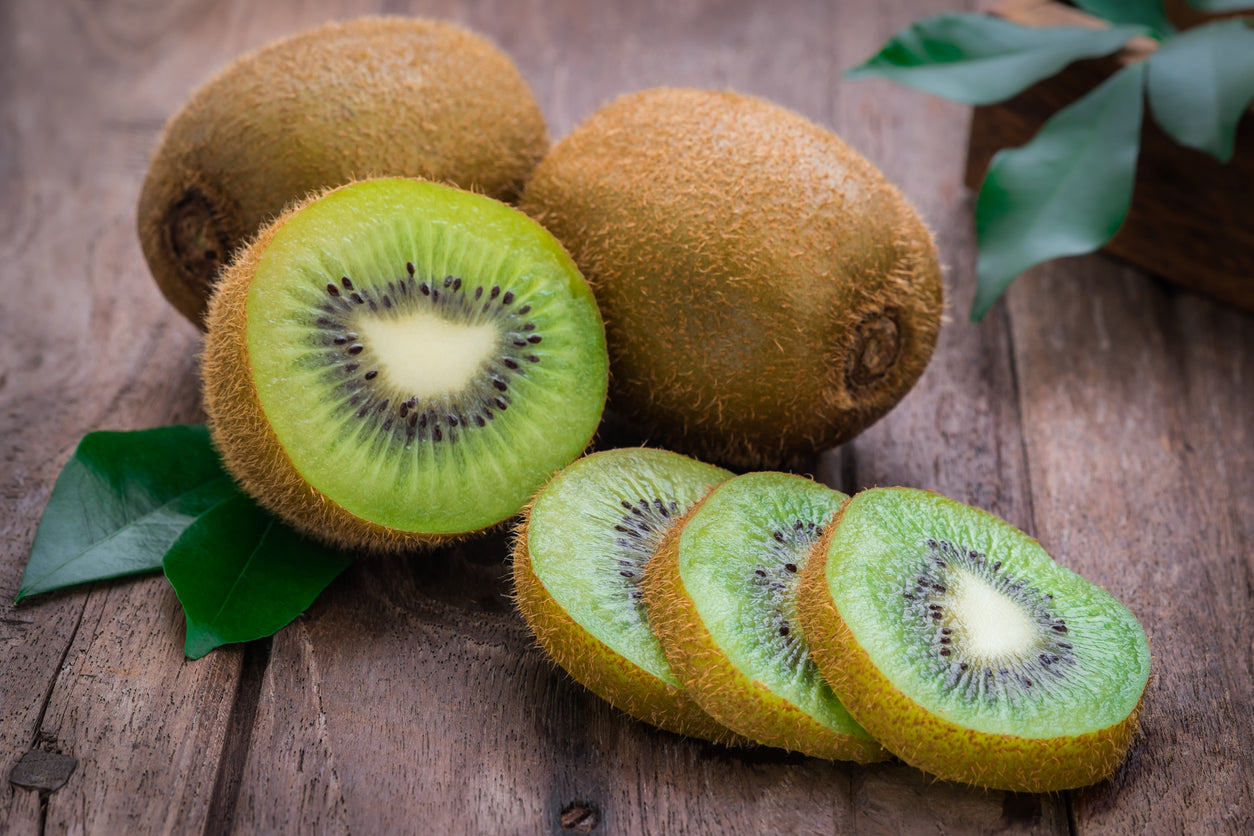How kiwifruit helps lower blood pressure and support cardiovascular function

The kiwifruit, botanically known as Actinidia deliciosa, illustrates the wisdom of not judging a book by its cover. While its dull-colored, fuzzy skin makes the kiwi look unpromising, this plain, no-frills covering conceals a sweet, juicy, emerald-colored interior.
Kiwis are more than just a treat for your taste buds. They also promote health and well-being in surprising ways. Let’s see how kiwifruit supports heart health - and more.
Reduce risk of atherosclerosis with kiwis
Several recent studies highlight the heart-healthy benefits of kiwis. A 2022 trial published in Nutrients shows that two kiwifruit a day for seven weeks lowered blood pressure and caused other improvements to cardiovascular health. In addition, a study of male smokers showed that three kiwifruit a day caused reductions in blood pressure and platelet aggregation - a fancy term for the tendency of blood to form into clots - and a contributor to artery-clogging atherosclerosis.
Kiwis are rich in lutein and zeaxanthin, a pair of carotenoids (plant pigments), which act as antioxidants to help scavenge free radicals and reduce oxidative damage. They also contain potassium, vital to regulating blood pressure and maintaining heart health. (Unsurprisingly, a 2018 review of studies published in the American Journal of Clinical Nutrition showed that higher dietary intake of vitamin C, carotenoids, and vitamin E - all contained in kiwis - is associated with a lower risk of heart disease). Finally, kiwis may help reduce triglycerides or fats in the blood while boosting HDL cholesterol. (In other words, enjoying kiwis may earn you a “Thanks, mate!” from your heart).
“Level up” your vitamins, minerals and fiber with kiwifruit
A serving of two medium kiwis offers 230 percent of the daily recommended amount of vitamin C, an important nutrient for healthy arteries. Vitamin C also helps with iron absorption, meaning eating kiwis may help prevent iron-deficiency anemia.
The serving also delivers 70 percent of the RDA for vitamin K - a fat-soluble vitamin needed for normal blood clotting and bone health. Vitamin E, potassium, and copper are also present in healthy amounts, and a hefty four grams of dietary fiber. With a mere 84 calories (less than an average apple), a two-kiwi serving is a tasty way to obtain important nutrients.
Promote digestive health with kiwis
According to scientists and nutritionists, kiwis are just plain good for your digestion. For one thing, they contain an enzyme known as actinidin, which enhances the efficient breakdown of protein. And they contain both soluble and insoluble fiber. Soluble fiber helps to support a healthy balance in the gut microbiome, while insoluble fiber helps to speed the elimination of waste and prevent constipation.
A study of 79 people with chronic constipation showed that eating two kiwis a day for four weeks helped to increase bowel frequency and reduce straining. Participants also reported being more satisfied with the kiwi intervention compared to alternate treatments with prunes or psyllium husk. While it’s not the most glamorous attribute of kiwis, the fact is that they really can ramp up your gut health while helping to “keep things moving” through the digestive tract.
The pleasant flavor of kiwifruit harmonizes well with other foods
Although they are native to China, kiwis have been enthusiastically adopted by New Zealand, which is a top producer. The kiwifruit gets its name from its furry peel, reminiscent of the brownish-gray feathers of the kiwi, a large flightless bird native to New Zealand.
Although the peel of the kiwi is edible, it has a fuzzy consistency that some people find off-putting, and most kiwi fans prefer to nibble only on the delicious interior of the fruit. The tiny, jet-black seeds are perfectly edible as well.
Don’t eat kiwis if you are allergic to them. A sensitivity to pollen, latex, or other fruits can increase the risk of kiwifruit allergy. If in doubt, see an allergist for testing.
The taste of kiwis has been described as a happy marriage of sweet strawberry and tangy lemon. Slices of ripe, fresh kiwi fruit are naturally tasty and require no seasoning or dressing. (But, if you want to drizzle them with a bit of lime juice and honey, we won’t judge).
Because kiwis contain the enzyme actinidin, they act as a natural meat tenderizer and excel in marinades for beef and chicken. And their light, citrusy flavor enhances fish, shrimp, and crabs. You can also use kiwis in fruit tarts, ice cream, sherbet, and mousses. Or, add kiwifruit to your favorite green smoothies, where it “plays well” with apples, ginger, and carrots.
Don’t let the kiwifruit’s furry exterior deceive you. Kiwis make a fabulous addition to your healthy diet.
Sources for this article include:






